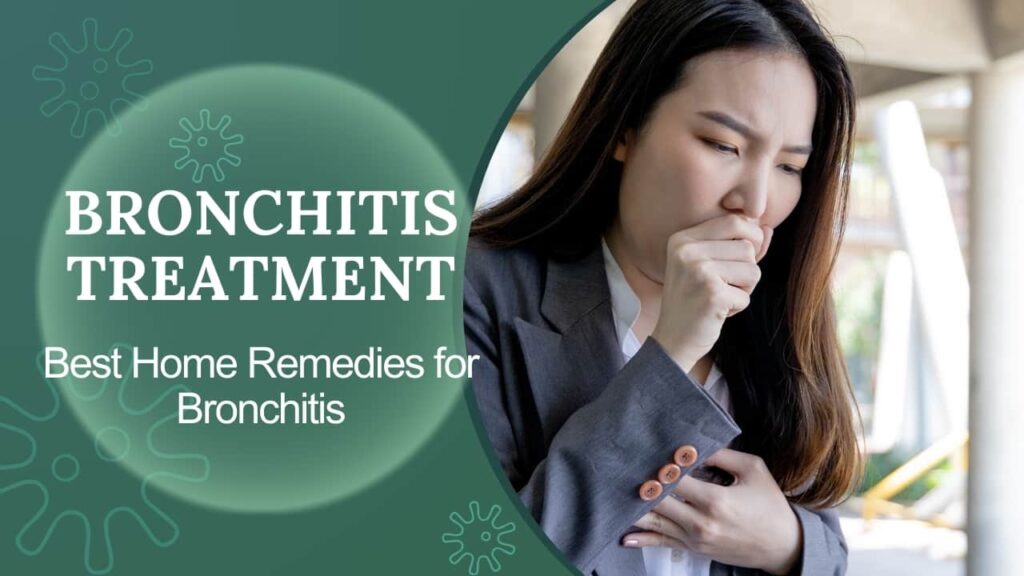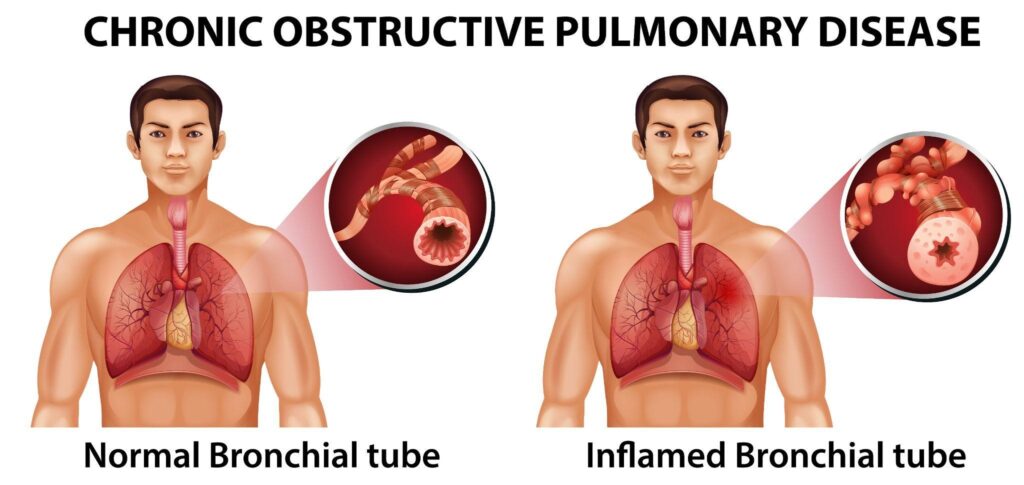Last updated on July 14th, 2025 at 11:10 am

Bronchitis causes inflammation in the bronchial tubes, leading to persistent coughing, mucus buildup, and breathing difficulties. It is classified into acute bronchitis treatment and chronic bronchitis treatment, each requiring specific treatments.
This nasty situation messes with your bronchial tube, blocking the air you need and making every breath feel like an exercise. Doctors divide this hassle into two types: the acute bronchitis treatment kind and the long-haul version, chronic bronchitis. They each get their battle plan depending on how bad they are and what symptoms they throw at you.
Managing chronic bronchitis treatment requires long-term treatment, including inhalers, lifestyle modifications, and medications, and switching up your lifestyle and various treatments. If some annoying bacteria crash the body, doctors might throw antibiotics into the mix to show them the door.
Dealing with allergic bronchitis treatment is a different story — avoid those allergens and pop a few antihistamines or use inhalers to calm the flames.
Now, kiddos with bronchitis — they need few gentle, yet tough love with treatments built for the little individuals.
Looking to expose analyses about bronchitis? This guide’s got your back with the scoop on kicking back at home, when to bring in prednisone, and other med-based game plans to get your lungs back in best form.
Bronchitis Diagnosis & Treatment
Before starting bronchitis cough treatment, it’s essential to determine whether you have acute or chronic bronchitis. Doctors analyse bronchitis through:
- Physical Examination: Checking for coughing, mucus production, and respiratory patterns.
- Chest X-rays: To exclude pneumonia or other bronchial diseases.
- Sputum Tests: Identifying bacterial diseases that require medicines.
- Pulmonary Function Tests: Assessing breath control, especially in chronic bronchitis cough treatment.

Bronchitis Treatment Options
1. Acute Bronchitis Treatment
- Rest & Hydration: Helps thin muck for effortless exclusion.
- Over-the-counter (OTC) Medications: Pain relievers and cough suppressants are indicative of relaxation.
- Bronchodilators: Open airways for better respiration.
- Humidifiers & Steam Therapy: Keep airways moist and relieve syndromes.
2. Chronic Bronchitis Treatment
- Inhalers: Reduce ventilating pipe irritation and improve respiration.
- Oxygen Therapy: Used in serious cases accompanying poor oxygen levels.
- Pulmonary Rehabilitation: An organized program to build up lung function
- Lifestyle Changes: Avoiding cigarettes, pollution, and cold air prevents flare-ups.
3. Allergic Bronchitis Treatment
- Antihistamines: Reduce hypersensitive responses that provoke bronchitis.
- Allergy Immunotherapy: Helps dull the immune system.
- Avoiding Triggers: Identifying and stopping apart allergic reactions.
4. Prednisone for Bronchitis Treatment
Prednisone is a corticosteroid that helps break down inflammation in the bronchial tubes, making the respiratory system relaxed. It is typically recommended for serious or deep-rooted bronchitis cases where infection leads to important ventilating pipe obstruction.
How Prednisone Helps:
- Reduces swelling in the airways
- Lowers mucus production
- Enhances lung function for easier breathing
Possible Side Effects of Prednisone:
- Weight gain
- Increased blood sugar levels
- Weakened immune response
Prednisone should only be taken under pharmaceutical surveillance due to potential side effects.
Need Medications for Bronchitis?
Medkart offers a wide range of medicines for bronchitis, including trusted cough syrups like Ascoril LS.
Order Ascoril LS Syrup 100ml/Relent Plus Syrup now, and get doorstep delivery at affordable rates.
Home Remedies for Bronchitis
If you choose organic therapies, various home remedies can help manage bronchitis symptoms and treatment effectively:
1. Acute Bronchitis Treatment at Home
- Ginger & Honey Tea: Soothes throat sensitivity and reduces pain.
- Steam Inhalation: Helps loosen muck for smooth discharge.
- Turmeric Milk: Acts as an anti-provocative power.
2. Allergic Bronchitis Home Treatment
- Saltwater Gargle: Reduces throat sensitivity.
- Essential Oils (Eucalyptus, Peppermint): Provide relief from blockage.
- Probiotics: Support immune function to prevent flare-ups.
3. Bronchitis Natural Treatment
- Vitamin C-rich foods: Restore immunity.
- Hydration: Drinking warm fluids helps in muck pruning.
- Rest & Proper Sleep: Helps in speedy improvement.

Preventive Measures for Bronchitis
While bronchitis may be medicated efficiently, stopping it is a high-quality approach. Follow these deterrent measures:
- Quit Smoking: Smoking damages the bronchial tubes and increases contamination risk.
- Get Vaccinated: Flu and pneumonia vaccines help counter contaminations superior than bronchitis.
- Maintain Good Hygiene: Frequent handwashing reduces the spread of disease.
- Avoid Pollutants: Curtail exposure to dust, fumes, plus allergens.
- Strengthen Your Immune System: Exercise with proper sleep, and a healthy diet support ward off diseases.
When to Seek Medical Attention
Bronchitis syndromes generally resolve with home care, but medical care is necessary if you occur:
- High fever everlasting for three days as well.
- Severe deficiency of breath or coughing.
- Coughing up blood or yellow-green muck.
- Symptoms everlasting more than three weeks.
- Recurring bronchitis episodes may indicate a chronic condition.
Conclusion
Bronchitis may be effectively controlled accompanying the right hospitalization, either through medications like prednisone, bronchitis treatment antibiotics for bacterial infections, or natural home remedies. If you experience persistent bronchitis symptoms and treatment, consult a healthcare specialist for the best medication.
Find the Best Bronchitis Medicines at Medkart Pharmacy
Delve into Medkart Pharmacy’s selection of bronchitis medicines for effective relaxation and better respiratory strength.
Shop Now for Affordable Bronchitis Medications!
FAQs on Bronchitis Treatment
1. What are the symptoms and treatment of bronchitis?
Bronchitis symptoms include a persistent cough, chest congestion, mucus production, shortness of breath, mild fever, and fatigue. Treatment depends on the type—acute bronchitis may improve with rest, fluids, and cough medicines, while chronic bronchitis often requires inhalers, medications, and long-term lifestyle changes.
2. How is chronic bronchitis managed?
Managing chronic bronchitis involves a combination of daily inhalers, prescribed medications, lifestyle changes like quitting smoking, and routine checkups to keep symptoms under control.
3. What is the treatment for allergic bronchitis?
Treatment usually includes avoiding allergens, taking antihistamines, and using inhalers or bronchodilators to ease breathing.
4. Can acute bronchitis be treated at home?
Yes, home treatment like staying hydrated, using steam inhalation, and taking non-prescription medicines can help manage symptoms effectively.